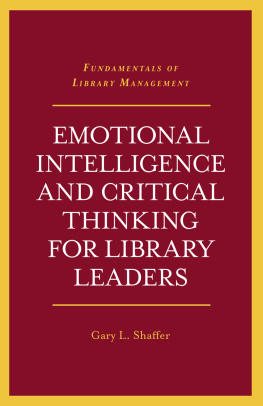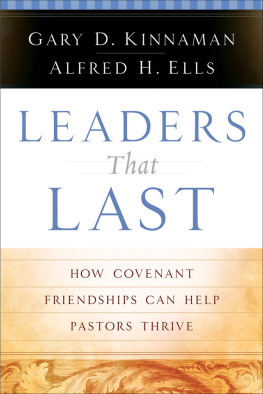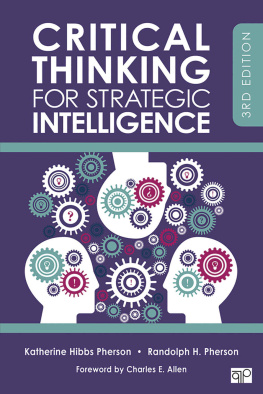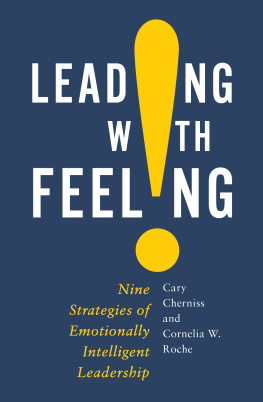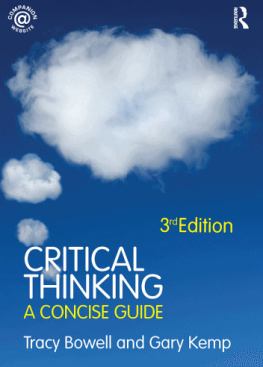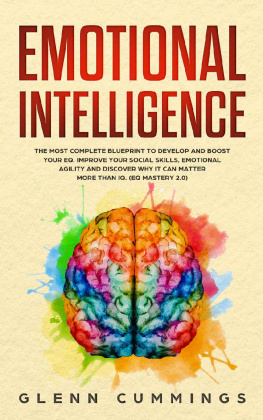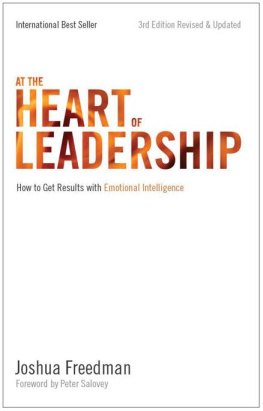Shaffer Gary L. - Emotional Intelligence and Critical Thinking for Library Leaders
Here you can read online Shaffer Gary L. - Emotional Intelligence and Critical Thinking for Library Leaders full text of the book (entire story) in english for free. Download pdf and epub, get meaning, cover and reviews about this ebook. year: 2020, publisher: Emerald Publishing Limited, genre: Business. Description of the work, (preface) as well as reviews are available. Best literature library LitArk.com created for fans of good reading and offers a wide selection of genres:
Romance novel
Science fiction
Adventure
Detective
Science
History
Home and family
Prose
Art
Politics
Computer
Non-fiction
Religion
Business
Children
Humor
Choose a favorite category and find really read worthwhile books. Enjoy immersion in the world of imagination, feel the emotions of the characters or learn something new for yourself, make an fascinating discovery.
- Book:Emotional Intelligence and Critical Thinking for Library Leaders
- Author:
- Publisher:Emerald Publishing Limited
- Genre:
- Year:2020
- Rating:3 / 5
- Favourites:Add to favourites
- Your mark:
- 60
- 1
- 2
- 3
- 4
- 5
Emotional Intelligence and Critical Thinking for Library Leaders: summary, description and annotation
We offer to read an annotation, description, summary or preface (depends on what the author of the book "Emotional Intelligence and Critical Thinking for Library Leaders" wrote himself). If you haven't found the necessary information about the book — write in the comments, we will try to find it.
Emotional Intelligence and Critical Thinking for Library Leaders — read online for free the complete book (whole text) full work
Below is the text of the book, divided by pages. System saving the place of the last page read, allows you to conveniently read the book "Emotional Intelligence and Critical Thinking for Library Leaders" online for free, without having to search again every time where you left off. Put a bookmark, and you can go to the page where you finished reading at any time.
Font size:
Interval:
Bookmark:
EMOTIONAL INTELLIGENCE
AND CRITICAL THINKING
FOR LIBRARY LEADERS
AND CRITICAL THINKING
FOR LIBRARY LEADERS
GARY L. SHAFFER

United Kingdom North America Japan India
Malaysia China
Emerald Publishing Limited
Howard House, Wagon Lane, Bingley BD16 1WA, UK
First edition 2020
Copyright 2020 Gary L. Shaffer.
Published under exclusive licence by Emerald Publishing Limited.
Reprints and permissions service
Contact:
No part of this book may be reproduced, stored in a retrieval system, transmitted in any form or by any means electronic, mechanical, photocopying, recording or otherwise without either the prior written permission of the publisher or a licence permitting restricted copying issued in the UK by The Copyright Licensing Agency and in the USA by The Copyright Clearance Center. No responsibility is accepted for the accuracy of information contained in the text, illustrations or advertisements. The opinions expressed in these chapters are not necessarily those of the Author or the publisher.
British Library Cataloguing in Publication Data
A catalogue record for this book is available from the British Library
ISBN: 978-1-78973-872-8 (Print)
ISBN: 978-1-78973-869-8 (Online)
ISBN: 978-1-78973-871-1 (Epub)

To Alicia, Bryce, and Brinn, may you always be guided by emotional intelligence and critical thinking.
Thank you for your love and support.
This book is the first in a planned series of seven. Each book will take an in-depth look at two (of 14 total) foundational competencies for library leaders and managers as defined by the Library Leadership and Management Association a division of the American Library Association (). This book will cover emotional intelligence and critical thinking. Other books in the series will cover topics such as:
Collaboration and partnerships Marketing and advocacy Ethics | Team building Project management |
Forward thinking Evidence-based decision making | Communication skills Change management |
Budget creation and presentation | Problem solving Conflict resolution |
When this author, a library practitioner, researcher, and professor of library management, feels that the topics are important, but do not appear to be addressed by the LLAMA Foundational Competencies (e.g., fundraising), he will attempt to place that topic within the confines of the competency that he feels is most related, such as in this case, budget creation and presentation.
While the series will be based in research, it is meant for a practitioner audience and thus will err on the side of practical advice. In addition to being a researcher in management and leadership, having formerly run the Center for Library Leadership and Management at the University of Southern California (USC), the author is also a practitioner, having run two public libraries. He has also been a member of an executive team or consulted with the executive team in three other large urban public libraries over his 15+ year career in librarianship. While not an academic librarian, the author was housed within the Doheny Memorial Library and did collaborate with academic librarians often while at USC. The author has also been a member of the Special Library Association (SLA), has supervised many students in internships in special libraries, attended SLA conferences, and often consulted with his corporate special library during a previous career in advertising. Thus, he will attempt to address management and leadership variables that may be of particular interest to those working in special libraries as well. Last, the author has consulted with school librarians throughout his career, counting many as close acquaintances, and will do his best to address their challenges as well. In general, this work is meant to aid all librarians who wish to improve their management and leadership skills. He hopes you will enjoy this series.
LLAMA. (2014). Leadership and management competencies. Retrieved from http://www.ala.org/llama/leadership-and-management-competencies
A sincere thanks to the library leaders who participated in the various studies that inform this book. A special thank you to the library directors who allowed me to interview them and build the case studies featured in this text. A thank you is also due my fellow researcher Pat Kreitz, who preceded me in my doctoral program by a few years, helped me by showing me the way, and encouraged me to use her research; to Peter Hernon, (retired) Professor Emeritus at Simmons University, who pushed me to build on his substantive work on emotional intelligence in library leaders and held my hand through my very first research study; and to my colleagues at Marshall School of Business at the University of Southern California for their work in developing the USC Critical Thinking model and to the school for allowing me to reference it. Particularly, I would like to thank USC Marshalls Marion Philadelphia, A. J. Ogilvie, Gita Govahi, and Lanore Larson, the keepers of critical thinking at Marshall. A special thanks is due to the Library Leadership and Management Association (LLAMA) at ALA who first surfaced the 14 competencies which inform this series. I also wish to thank Susan Grode for her thorough advice. Last, I would like to acknowledge Charlotte Maiorana at Emerald Publishing for asking me to write this series and Charlie Wilson also of Emerald Publishing for her assistance with the manuscript. Thank you all!
Emotional intelligence, which Daniel ), maintain follower trust, and work collectively to achieve the organizational mission.
While Daniel Goleman did not discover emotional intelligence, he certainly can be credited with popularizing the theory, which he did in his 1995 bestselling book Emotional Intelligence: Why It Can Matter More than IQ ().
Not much scholarly work has been published on emotional intelligence in libraries, so this book will rely heavily on the work of a few earnest scholars in the profession that have investigated it, while expanding to other researchers outside librarianship to help fill in gaps. As this is meant to be a practical text with much application, the author will also draw on real-life examples from his career and those of other library leaders. He will also borrow heavily from his soon-to-be-published Emotional Intelligence study, which he conducted, as well as its associated case studies (four of which are featured in this book). The study investigated public library leaders use of emotional intelligence traits during times of economic crisis, particularly the recession of the late 2000s and early 2010s and its aftermath.
In order to present the information in an organized fashion, this book will use as its framework Golemans and his colleagues four domains of emotional intelligence. These being: self-awareness, self-management, social awareness, and relationship management ().
As previously, stated the emotional intelligence theory this book uses for its basis is made up of four domains as defined . They are self-awareness, self-management, social awareness, and relationship management. Briefly, these researchers defined these domains as follows (pp. 4051):
Font size:
Interval:
Bookmark:
Similar books «Emotional Intelligence and Critical Thinking for Library Leaders»
Look at similar books to Emotional Intelligence and Critical Thinking for Library Leaders. We have selected literature similar in name and meaning in the hope of providing readers with more options to find new, interesting, not yet read works.
Discussion, reviews of the book Emotional Intelligence and Critical Thinking for Library Leaders and just readers' own opinions. Leave your comments, write what you think about the work, its meaning or the main characters. Specify what exactly you liked and what you didn't like, and why you think so.

